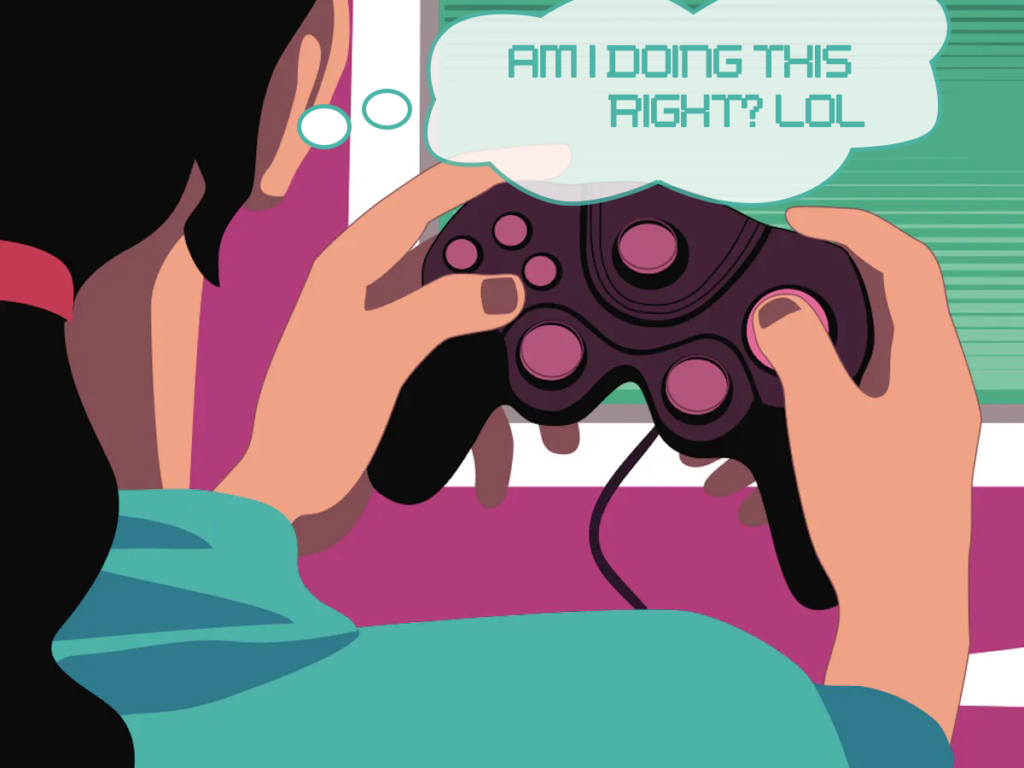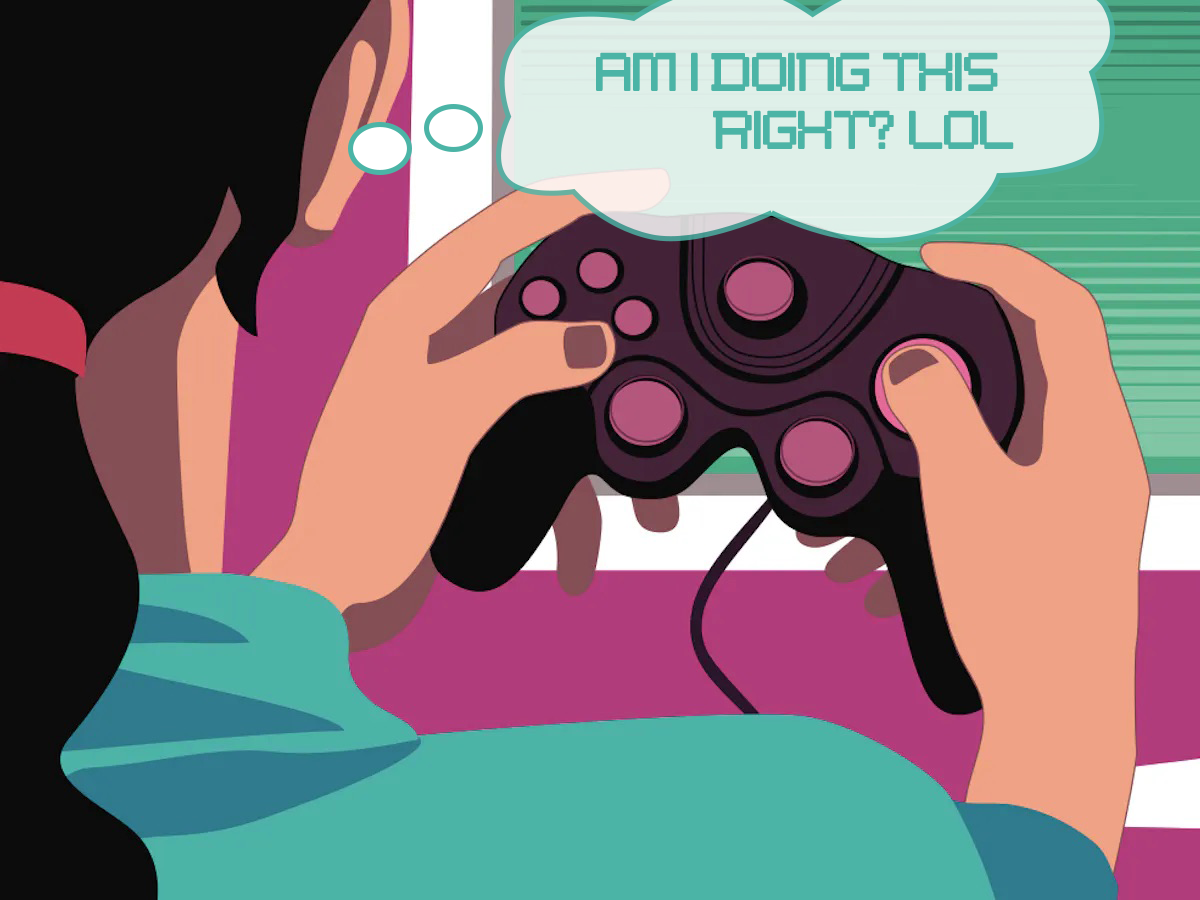
Am I Doing This Right? Failing Games and Subversive Play
I was compelled by the Ruberg chapter to explore this topic further and skimmed over some of Jack Halberstam’s work. In his book “The Queer Art of Failure,” Dr. Jack Halberstam discusses the idea of failing as a queer art form. He posits that, in a world that is constantly telling queer people that they are not good enough, failing can be a subversive act. Ruberg argues, perhaps in conjunction, that “play itself can constitute a form of queerness in video games that goes beyond the representation of LGBTQ characters or romances”. The chapter “The Queer Art of Failing at Video Games” proposes a refreshing perspective that aligns the idea of misappropriating purpose, rhetoric, and procedure with queer identity. The social institution of video games demands a type of conformity to play, to purpose, and to identity. In some ways, I feel isolated from video games because I often create purpose and goals that subvert the original aspects of gameplay. I felt heard in Ruberg’s discussion about game failure and it posed a lot of questions for me about the subjectivity of failure.
I would argue that identity is indoctrinated in everything. Every word spoken; every action committed; every feeling felt or understood. These identities interact with gaming, both as an institution (by this I mean, as a social concept, rather than the intricate subcultures and specific examples of video games) and as instruments and mediums of play. So often, though, at least in my experience, these mediums are designed–either explicitly or implicitly– to modify behavior and police the expression of our identities. This institution wants so badly not only to moderate the invited identities, but also to modify any identities that violate its prescribed doctrine (usually heteronormative and male). It follows, then, that in initializing processes and goals within games which are reminiscent of certain prescriptive identities– and discouraging opposition to these processes both discourages failure procedurally– implies a moral or ideological failure in not complying to what success represents.
I often find myself feeling isolated from other gamers because my relationship to gaming is so different from what is considered “normal.” When I was younger, I played video games to escape from reality or imagine new ones. Nowadays, I play them to examine reality. For me, gaming has always been political; it has never just been about entertainment (see my long-winded post about Doom vs Myst lol). This is likely due in part to my identity as a woman and as a queer person. Our society is so deeply ingrained with patriarchal and heteronormative values that it can be difficult for me to find forms of media that don’t reinforce those oppressive values. What makes it more difficult is that these oppressive values aren’t only perpetuated by games procedurally, but by the industry and as a concept as a whole.
Queerness, according to Ruberg, is “the deliberate misuse of something—an object, a concept, or a system—for purposes other than those for which it was designed.” When we think about queerness in relation to video games, we often think about LGBTQ+ characters or romances. However, queerness can also be found in the way we play the game. Queer players often find themselves at odds with the structures of mainstream gaming culture because they’re not playing to win—they’re playing for fun, for self-expression, or to subvert the dominant narratives.
With that said, one way I felt was relevant in my understanding of game failure was as it relates to me as a woman. Most of the people who make and design video games are men, and so the games tend to cater to their interests and skills. As a result, when women fail at games, it only reinforces the stereotype that they’re bad at them and that they don’t belong in the gaming world. This leads to more patronizing and exclusionary behavior from male gamers, which makes it even harder for women to break into the gaming community. There is an added risk to failure as a woman and the joke is that either way you kind of lose. Either you win the game and exceed expectations for women or you lose the game and validate expectations. In the case of the former, my experience has been that you are assumed to lose parts of your identity in exchange for this win. Femininity and video games “cannot coexist”. I am not good at many games, but when I am good on occasion, especially at a game that usually invites cis men, I am met with the feeling that I am being tolerated in this space, but my identity shouldn’t infiltrate the game. In the case of the latter, I am reduced to being a delicate, feminine woman who is of course bad at gaming because it’s not for her. I’ve spoken to many women in this class who haven’t had this experience and I’m so glad that there are communities and situations that don’t provide this paradox to women. Unfortunately, for me, I’ve always felt there’s more at stake when I fail.
And so, when I approach gaming now, my goal is not necessarily to “win” but rather to use gameplay as a tool for social commentary and change. Play itself can constitute a form of queerness in video games that goes beyond the representation of LGBTQ characters or romances—a form of queerness which Halberstam would likely approve of given his thoughts on failure as a subversive act. There is beauty in failure that I would love to explore. There are adventures in the ways games are not meant to be played. It’s how I like playing games, but I am also conscious of what that means as it intersects with my identity. Or maybe I’m reading into it and being dramatic. Your call 😉
p.s Sorry for making every post about womanhood lol I switched it up with the added queerness this time


I also liked the Ruberg excerpt a lot and I find what you say to be a really interesting perspective because in the chapter, Ruberg primarily focuses on how queer play can manifest through how a person plays and what a person plays, in that intentionally playing to fail subverts established notions of what is considered success versus failure or what is considered “fun”. However your experience with seeing your success while playing video games being considered by others a novelty, exceeding what is expected, raises the idea that queer play can also manifest through who plays. That is, people and communities which are often marginalized in certain gaming communities engage in queer play always when playing, simply by being who they are, because they subvert notions of who should/can play video games or who can “truly” enjoy them. I liked this post a lot because I found it affirming of my own experiences with playing video games and feeling a sort of pressure to perform well. I agree with you in that I think video games can be an important tool in empowering marginalized groups in an engaging and inclusive way.